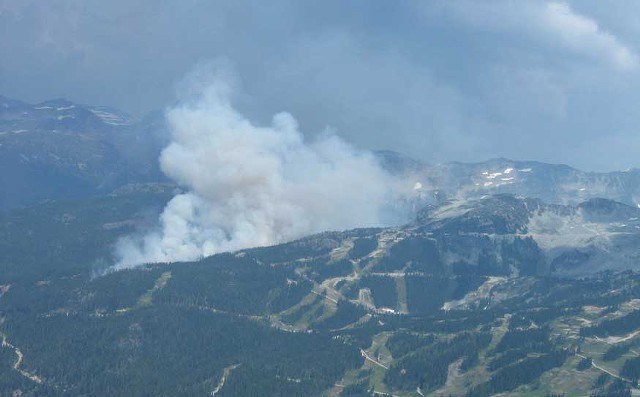An early start to Whistler's mountain bike season is not without its downsides.
A lighter than usual snowpack in the valley and below average spring precipitation has resulted in drier than usual conditions for this time of year. As of Thursday, May 2, the Fire Danger Rating had moved up to Moderate, far earlier than the past four years of cool, wet springs. By the end of the weekend the rating could move up to High - something that would trigger fire watches and possibly other restrictions for contractors and others working in the forest interface.
Chief Rob Whitton of Whistler Fire Rescue said there's a definite drying trend right now.
"What the weekend will bring with temperatures in the mid-to-high 20s? I wouldn't be surprised to see us get up to High by Sunday," he said. "It happens quickly. With all the wind we get up and down the valley, it tends to dry things out quickly."
Whistler Fire Rescue will be posting regular fire hazard updates to the community soon, and is already communicating directly with construction companies.
Whitton stresses that they do not set the Fire Hazard Rating, those decisions are made by the Coastal Fire Centre. Fire restrictions are also outlined by provincial regulations.
As for public awareness, Whitton's office will be taking out ads soon to advise people of the hazard, as well as new rules for the community. For example, backyard brush burning has been banned in Whistler since 2011. Instead, dumpsters will be set up at the Nesters waste transfer station for yard waste, at dates to be announced soon.
Backyard fire pits will still be allowed, but now homeowners need an inspection by Whistler Fire Rescue to get a valid permit. They're also banned completely from June 15 to September 15.
If you burn brush, you could be fined $300 for a first offence. Failing to have a permit for a backyard fire pit carries a fine of $500.
Whitton said Whistler Fire Rescue has also placed signs in popular bonfire locations around Whistler, such as the Green Lake spit, the south end of Alta Lake and old gravel pits to let people know about ban on fires and permit requirements. As well, they're encouraging members of the public to be vigilant and report any fire activity "before it gets out of hand," said Whitton.
Whistler Fire Rescue tends to respond first to fires within municipal boundaries, but do work with provincial fire crews based in Pemberton as well. Whitton said the two crews meet every year to discuss logistics, and will host some joint training.
"It nice to put faces to names and compare equipment so they're aware of what equipment we've got to help them out and vice versa," explained Whitton.
Donna Macpherson, the communications officer for the Coastal Fire Centre confirmed the rising fire risk in the Whistler area.
"In the next few days we're calling for weather on the coast that's going to be considerably warmer and drier, and the main concern for us is the outflow winds we sometimes get - and our forecaster thinks we're going to get them," she said. "Outflow winds are when the winds that usually come from the west over the ocean instead come from the other way, which means they're coming from drier locations in the interior, moving along the river valleys like Pemberton.
"If people could be careful if they're backyard burning or camping that will help a lot. If people are going into the forest they should be careful with what they're doing, and if they have campfires then they should make sure they're completely out when they leave."
MacPherson said there have been seven fires to date in the Coastal Fire Centre, not including any fires attended within municipal boundaries by municipal crews. That's about average for this time of year based on the last 10 years of data, although it's higher than the past few years at this time. All were human caused.




